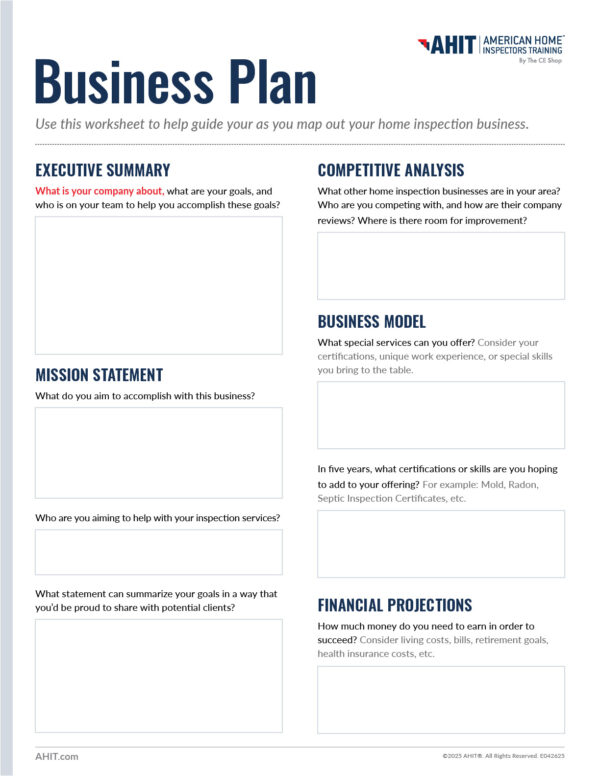
Your Guide to Starting and Growing Your Home Inspection Business
It’s one thing to complete a successful home inspection — but it’s another to run a successful home inspection business! We sat down for a chat with our national home inspection expert and resident AHIT instructor, Steven O’Donnell, who shared some of his top tips for business success. Here are five solid strategies to get you from just inspecting to running your home inspection business like a pro (PLUS: a few helpful worksheets for planning your business).
#1 – Develop Your Home Inspection Business Plan
When Steve O’Donnell — our National Home Inspection Expert and AHIT’s first student — started his home inspection journey, he admits he was clueless about starting a business (like everybody else!). He wanted his own business with low startup costs, and decided running a home inspection franchise would be an overly expensive option to do so. Plus, he wanted to be self-sufficient.
If this sounds like you, you’ve come to the right place.
Before you get your business off the ground, you’ll need one to start with. Here are a few tips for starting a home inspection business that will thrive.
Name and Register Your Business
Before you can run your own business, you’ve gotta come up with your name, and register your business! This process includes getting your EIN (Employer Identification Number) so that you can be taxed correctly. When you name your business, consider your personality and the things that make you stand out as an inspector. Check out our blog for more in-depth tips on choosing your home inspection business name.
Get Errors and Omissions Insurance
There’s a good chance that if you’re licensed, you already carry Errors and Omissions Insurance. If that’s you — great! If you don’t live in one of the states that requires licensed inspectors to carry E&O Insurance, here’s your friendly reminder to get signed up when you create your business. As an inspector, this is your holy grail to keep you and your business legally protected.
Develop a Home Inspection Business Plan
Steve says a lot of solo home inspectors struggle to run the business side of a home inspection company — whether it’s the banking, taxes, insurance, or another element. This is where careful planning can help set you apart. If you take the time now to plan your business, it will be easier to execute it, to stick to your budget, and to meet your goals.
Here’s a cheat sheet to help you break down the most important parts of your business plan.
Home Inspection Business Plan Worksheet

Keep in mind that even though you might be starting this business on your own, there is always room to grow.
Once Steve’s employees joined his company, they were each able to increase their business to 400-500 inspections per year versus the 100 they had been doing. That’s huge growth, and it’s possible for your business, too.
Determine Your Home Inspection Business Startup Costs
Just like getting your license, there are startup costs involved with getting your business off the ground. Here’s a handy checklist to help you outline your needs in the first few months of business, and help set your financial goals.
Home Inspection Business Startup Cost Worksheet

#2 – Put Yourself Out There
As a home inspector, you might be someone who feels more comfortable in the background — someone who thrives in hands-on, technical environments that involve independent work and critical thinking. Luckily, by running your own business, what you do and how you do it is on your own terms, but you’ll need to put yourself out there to build connections in order for your business to thrive!
“It takes courage to put yourself out there, but building relationships is key,” says Steve. “You have to go to real estate functions, mixers, open houses, CE classes at brokerages… and it’s hard! Many home inspectors come from trades, and they aren’t used to this kind of approach.”
So, just as real estate agents knock on doors to get business, you’ll have to get comfortable with visiting brokerages to meet new people and tell them about your business. It will get easier the more you do it! The next few tips will help you put this plan into action.
#3 – Become a Regular at Local Brokerages
One way that Steve suggests getting started networking is to get familiar with your local brokerages. This isn’t just a one-and-done step on the checklist, though. This will entail building a relationship with the people you meet and continuing to show up.
One sweet way to do this? Candy!
Steve’s inspectors delivered candy jars to real estate brokerages with business cards attached to them, as a token of appreciation. A jar of candy on the counter with your name on it? That’s inexpensive, fun advertising. Periodically, Steve and his team would go back to refill the jar (and sometimes they’d get calls asking for one)!
The candy jar gave his team an easy “in” and set them apart. Eventually, they also received an invitation to the weekly sales meeting for agents, where they were able to give short presentations on their business and make connections. Jackpot!
#4 – Join Your Local Board of REALTORS® or Local Real Estate Association
The #1 tip Steve likes to share with his AHIT students is:
First thing after you get your license or you complete your training, join your local board of REALTORS® or real estate association as an affiliate member.
What’s the big deal?
Here are some of the benefits to joining an association like this:
- Build your network through events
- Learn the goings-on in your local real estate market
- Opportunity to join an affiliate committee
- More benefits specific to your local association
When you become part of these communities, you open yourself up to tons of networking opportunities. You’ll have lots of opportunities at events to mingle with agents, share your business, and rake in the leads.
#5 – Develop Your Communication Skills
At the root of all of these tips is one solid skill: communication. As a home inspector, your duty is to inform. You are the bridge between people and the place where they will spend most of their time. So, the way that you communicate matters. Here are a few of Steve’s tips for better communication:
- It’s not the end of the world. Instead of, “This roof has a huge leak in it, and it’s probably going to collapse on you at any moment!”, try, “Unfortunately, this roof is beyond the normal life expectancy, and you should get a few quotes from roofers to replace it.”
- Save the scare tactics for Halloween. When you come across something iffy, you must know where the line is between informing and terrifying your client. A good way to practice this is to state the issue objectively and end with an action item — do not dwell on the risks.
- Read books and take classes to polish your skills. If you’re still a little shaky on how to communicate with your clients, check out some books on communication from your library, or find a webinar or course you can take to practice.
You’re Well On Your Way to a Thriving Home Inspection Business
You’re almost there, inspector! Once you develop your business plan and start putting yourself out there, you’ll start to see the fruits of your labor. And you’re not doing it alone! You have lots of professional development course options to help you along the way, and don’t forget to connect with other home inspectors, too, for an automatic support system.




